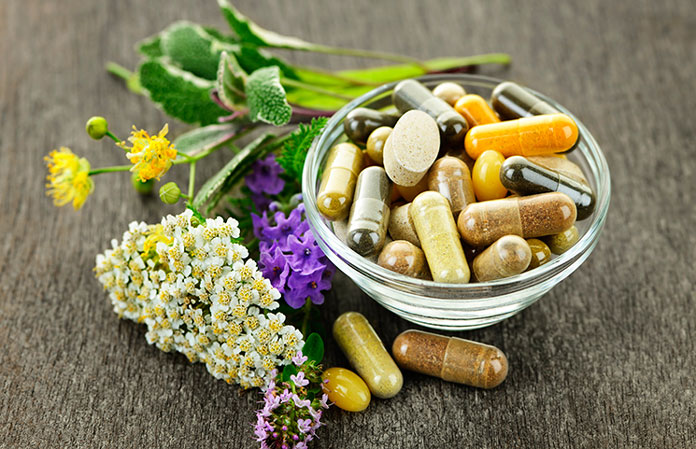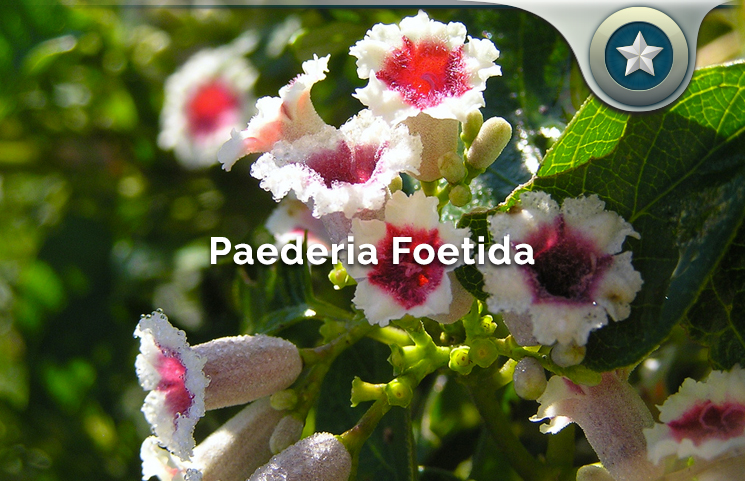Paederia Foetida is a plant species that is known to go by several common names. It is a native to the tropical regions of China but has been naturalized in the Hawaiian Islands and parts of North America. The plant has several variations that go by the names stink vine, skunk vine, and Chinese fever. The plant goes by various other names in Hindi that include:
- Akar
- Prasarini
- Gandhali
- Sekentut
The names vary from place to place with the above names being used commonly in India. The common English name for Paederia Foetida is Chinese fever because the plant is used to boost immunity after fever treatment.
Skunk vine is among the most common variations of Paederia Foetida and grows to heights of 1.5-7 meters long. It is a slender climbing plant that twins into other plants for support.
The Paederia Foetida is easily recognized by its fetid aroma or sulphurous odor when its leaves or stems are bruised or have been crushed. The smell is caused by the oils in the stem and leaves that contain sulphur compounds. Dimethyl disulfide is one such compound and is found in high amounts in the leaves.
The plant is native to parts of Eastern Asia which include China, Korea, Thailand, Cambodia, Laos, Vietnam, Malaysia, the Philippines, Indonesia, and the Indian subcontinent. It grows in woodlands and thickets, and can also be found along the edges of forests.
It is a fast growing plant and one that can be cultivated for its medicinal values and several other uses. It is a climber plant with lanceolate to ovate leaves that are 5cm long and 2.5cm wide.
Traditionally, Paederia Foetida is an herb that has been used for centuries to treat some aspects of male vitality. The plant has not been well studied, but current research shows that it plays a vital role in increasing testosterone levels in men. The herb Paederia Foetid is known to spread quickly in the body, an attribute that makes it a good remedy for relieving things like rheumatism, stiffness, and contraction pains.
Recent studies have shown that the plant contains the following compounds:
- Ceryl Alcohol
- Palmitic acid
- Hentriacontanol
- Hentriacontane
- Stigmasterol
- Methyl mercaptan
- Sitosterol
- Ursolic acid
It is a beneficial plant that is nowadays used widely in many testosterone boosting supplements.

Uses And Benefits Of Paederia Foetid
Edible Uses
The leaves of Paederia Foetida can be eaten raw or cooked. The leaves have a strong flavor and are sometimes mixed with other spices or grated coconut. They can then be eaten raw as a side dish with rice or other foods.
The leaves of the plant can also be minced and eaten, added to soup, or mixed with other vegetables or spices. They are sometimes be wrapped in a banana leaf and cooked over a fire to help remove the offensive smell they can produce. However, the leaves have a greater medicinal value than the flavor they contain. In countries like Taiwan, the sweet stem juice is sucked.
Medicinal Uses
The Paederia Foetida is known for treating ailments like colic, flatulence, gout, diarrhea, infertility, paralysis, rheumatism, abscesses, and dysentery. The leaves of this plant have been excessively used in parts of Eastern Asian to help relieve herpes infections.
The roots, on the other hand, have been used as an emetic, relieving spleen inflammation. The bark and leaves of the plant are known to help relieve constipation, asthma, urethral calculi, and assist in the expulsion of the placenta after a miscarriage.
Considerable research has been carried out on the therapeutic effect of this plant and several compounds recorded to be the cause of such beneficial effects. The plant is highly valued in parts of Asia for treating various digestive problems.
Several iridoid glycosides have been isolated from the plant and found to have antitumor activities. Some of these glucosides include scandoside, asperuloside, and paederoside. Paederoside has been shown to promote the highest levels of antitumor activities.
The bruised parts of the plant have the fetid odor of the methyl mercaptan. The smell is due to the damage to the plant tissues, which releases and enzyme that splits the sulphur containing the paederoside group.
Essential oils and alkaloids made from the plant have also been recorded which have shown anti-inflammatory properties. The plant has been used to treat individuals with arthritis, and it helps to relieve the inflammation and ease the pain of the patients. A soluble fraction of the aerial parts of the Paederia Foetida has been shown to have an anti-inflammatory effect in edema.
The plant has also been shown to have anticancer properties in the human epidermoid carcinoma. The ethanol extracts of the leaves have been shown to prevent carcinoma cancer in humans.
The methanol extract, on the other hand, has been shown to have some hepatoprotective potential. It has been shown to reverse various biochemical processes in the human body. The plant inhibits intestinal motility, making it a good anti-diarrhea remedy. This justifies its use in traditional medicine to help with digestive issues.

We have seen the uses of the leave in treating various intestinal problems like cramps, colic, dysentery and abdominal pain. On a study, the leaves were found to be astringent, depurative, antivirus, antirheumatic, vermifuge, and restorative. The plant is known to have great restorative powers.
The leaves are usually pounded, water is added, and they are then filtered. The filtered infusion is then drunk on a regular basis. The leaves can also be mixed with food or eaten raw. Most people in India often boil them with soup to lessen their smell before drinking the soup.
The leaves can also be applied externally to help treat bruises and swelling. You can crush the leaves and apply them on bruises to help with the healing process. On swelling, the leaves anti-inflammatory properties help reduce the inflammation and lessen the swelling.
The leaves can also be mashed up and used for nose ulcerations, earache, and swollen eyes. The mashed leaves can help treat herpes, a swollen belly, and can even be applied in bath water to be used as an anti-rheumatic. The juice of the leaves is considered astringent and used to treat diarrhea in children.
Studies of the plant have also discovered the aphrodisiac action of the plant, making it a common ingredient in most testosterone supplements on the market. In experiments done on rats, the amount of testosterone produced in rats given the plant was doubled.
Besides improving the testosterone levels, the Paederia Foetida treatment was able to improve the general sexual behaviours of healthy rats. More studies are on-going on the effectiveness of this plant in improving the testosterone levels in men.
Other Uses
The ethanolic extracts of the plant have been found to be toxic against aphid Myzus persicae that affects cabbage.
Benefits of using Paederia Foetida
- Decreased fat mass
- Increased libido in men
- Better overall well-being
- Better muscle pumps and blood flow
- Increased muscle fullness
- Enhances male vigor and vitality
Risks And Side Effects
Just like most health products, it is advised that you use Paederia Foetida products after consultation with a medical practitioner. Paederia Foetida has been found to have some side effects when taken in high quantities.
Individuals have been found to experience some dizziness when dosage exceeds 2000mg/Kg. The Paederia Foetida does not seem to have any dangerous side effects, making it a great addition to your diet as a supplement or as a food additive.
Further studies are ongoing to discover more side effects of the plant, but current statistics show that it is relatively safe.

Top Paederia Foetida Products
Various products exist in the market with Paederia Foetida ingredients as the main ingredient or an additional ingredient. Most of these supplements are usually testosterone boosting products such as Myokem Magnitropin, which is used to naturally boost the testosterone levels.
Prime male is another great product that contains Paederia Foetida and has been highly rated for its effectiveness. There are also a myriad of other products like Provacyl and test fuel, all of which contain Paederia Foetida.
Paederia Foetida Review Summary
Paederia Foetida is a great plant with tons of health benefits, and one that we should include in our diets on a regular basis. The plant leaves can be eaten raw or cooked. It is ideal for treating several ailments, among them digestive problems and inflammation.
Mashed leaves of the plant have been found to be quite effective in treating swelling and other skin problems. Several products have been manufactured with Paederia Foetida as an ingredient, and it work as an effective aphrodisiac, helping men with low testosterone levels.
Make sure you consult with your doctor before purchasing or using Paederia Foetida products to avoid unnecessary side effects. Raw leaves of the plant can help with bloating and abdominal disorders and are usually harmless as they do not contain any artificial constituents or preservatives.









